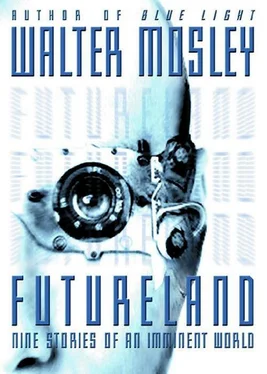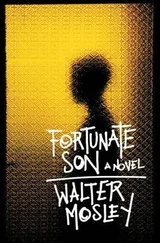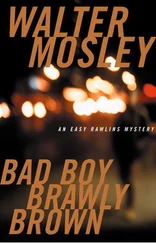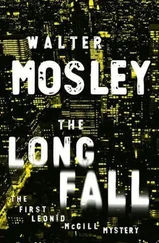An image of thousands of angry protesters appeared in the curve. Many were hurling flaming balls of waste tar, a byproduct of modern recycling dumps, at the security forces, which advanced in wheeled plexiplas bubbles, debilitating rioters with dozens of stun whips flailing out from all sides.
“Lars McDermott,” Chantel said, reappearing on the screen, “corporate ambassador to the UN, had this to say about today’s protest and annexation.”
The image of the middle-aged black woman shifted to the full image of a young white man in a rather close-fitting black andro-blouse.
“I applaud the annexation,” the man said in an indistinct European accent. “And, no, I do not feel that the Luxembourgers have any reason to fear this move. International Law expressly prohibits migrant labor from overwhelming a new territory beyond prescribed limits within the first twenty-five years.”
“But hasn’t Claw-Cybertech asked for a relaxation of the migratory clause?” a bodiless, masculine voice asked.
“That is only for them to be able to iron out a few labor problems in their Angolan holdings.” Lars McDermott’s smile belied his answer.
“Isn’t the unemployment cycle in Angola now up to thirty-five percent?” the voice inquired.
That smile again, and, “Merely a transitional phase. Claw-C has to retool for a more advanced chip market. That has nothing to do with Europe.”
Harold was astonished at how the extra chip he’d bought for the curve cleared up his digital reception. He said, “My fav,” and the station changed to a scene where three beautiful black women in military uniform were adjusting weapons holsters on their breasts before jumping out of an aircraft hovering over a moonlit island.
The winking lunar light between the ripples of the sea seemed so real that Harold moved closer to the IT curve, which took up fully half of his Tribeca loft subdivide. Enchanted by the ocean, he stuck his hand in and it disappeared momentarily under the waves. Chesty Love dived into his palm and swam out through his fingers.
“Hey hey hey.” Jamey Halloway’s blond head replaced the hovercraft. He had a maniacal look on his face. Harold leaped backward, shocked by the ITV buddy break-in call.
“Hey, man, you scared me,” Harold said.
“Turn on the two-way,” Jamey commanded.
“Two-way on,” Harold intoned.
Immediately the curve became Jamey’s room in the Bubble, a condominium that floated off the eastern shore of Staten Island. A small patch in the lower left-hand corner continued the Devil Girls show.
“How you feelin’?” Harold asked.
“Flu’s gone,” Jamey replied. “Just like the med-heads said, three days and it clears up. You wanna go out?”
“Naw, man. I might pick up somethin’ out there.”
“Aw, com’ on, bro. You know the nigs don’t get it.”
“Hey, man. Why you wanna use that kinda language?”
“Sorry, bro. I didn’t know you were sensitive.”
“I’m not sensitive,” Harold said. “It’s just that it’s not respectful.”
“I said I’m sorry, okay? Can we go out now?”
“I don’t know.”
“I found Yasmine,” Jamey said in a tantalizing tone.
“Where?”
“Blanklands.”
“No shit?”
“Not even an address. Down in an alley off of Gore near Yclef Terrace. You need a chip to get in and a hundred dollars cover to get out — and that doesn’t include Yas.”
“I’ll meet you there,” Harold said. Then he clapped his hands together three times, hard. The screen went blank and the curve rolled itself up into a scroll.
Harold rode his adult-size tricycle down Lower Broadway, headed for the Brooklyn Bridge. There had been no motorized traffic allowed on Broadway for over thirty years. A quarter of the streets in Lower and Upper Manhattan were closed to motor-driven vehicles because no cycler could afford the leasing fees and insurance rates on an automobile. Cycler was a term meant for those who rode the unemployment cycles, but it also fit those same individuals’ mode of transportation.
Harold rode down the crowded avenue looking at the crumbling old brick that showed here and there between holo-ads. Lower Manhattan was falling apart. Every now and then a building was refaced. But the only real improvements came when big business could find a profit niche. Lately that niche had been leased window holo-ads. All you had to do was put a holo-screen across your outside wall space and allow whatever advertiser to display his wares on it. At a dollar per square foot per day — for prime space, at prime time — you could make pocket money for the kids. And now with the new screens you could look out of your windows as if there were nothing there at all.
All down Broadway there were animated signs for leasing IT curves, household utilities, even furniture and some finer clothes. Almost everything by 2055 was leased. That stabilized the profit factor and created a built-in insurance policy. No one owned anything except the manufacturers.
Harold knew a lot about leasing because L&L Leasing was the company he worked for. L&L acted as a middleman for various industries. They advertised and brokered the deals while the major manufacturers supplied the goods.
“The people live on the installment plan,” XX Y, the revolutionary, said on the poster circulated over ghostnet, “while corpse-barons buy up the sky.”
The slogan played its way through Harold’s mind while he rolled over the Brooklyn Bridge. He knew that every word of what the militant chromosome of RadCons 6 and 7 said was true. But he also remembered what his professor, Len Gorzki, had said in Political Science 101 at City College.
“Product is everywhere and everything,” the slender, AIDS-ridden educator exclaimed. “From the bricks in the wall to the chair under your butts to your butt itself. It’s all product, either product or waste.”
Harold understood the threat posed to him. He believed in XX’s ideal but lived according to the cycles.
Blanklands was a moveable feast. A bar, restaurant, Eros-Haus, DJ joint hotbed of perversions and alternative lifestyles.
Yasmine Mü — onetime executive secretary for L&L Leasing — was now an Eros-girl working illegally for the drifting Blanklands boutique.
Harold had never met anyone like her. Her Persian family had become fabulously wealthy by developing one of the first labor corps in the Middle East.
A labor corps was a large group of men and women who did a specific kind of labor, usually manual, either at a home base or on location. From apple picking in Vermont to disaster relief in Peru, the labor corps provided sweat and sinew for an annual wage.
Yasmine’s parents owned a palace in southern Persia. They also owned two hundred thousand hands. Yasmine was their only child. Everything would one day belong to her. But she left it all for the prod’s life in New York City.
“My mum and da,” she said in her tutored English accent, “don’t see that it’s slavery. If you got married you were fired and fined. Salaries are paid in advance and so if you quit you’re arrested. Then the government confiscates your labor account and you’re forced to work out your term without pay. Everybody says that it’s good for the people. Da says that some people are made to work and others are made to rule. So I left and came here to live as a worker.”
She confided in Harold, called him a friend. But she never returned his ardent passions. Harold had loved her from the first moment he saw the grim longing in her eyes.
Jamey was waiting in the alley when Harold got there.
“Hey, man,” Harold said. “I thought you said the place was here.”
“It is.”
“Then how come we’re the only people here?”
Читать дальше












